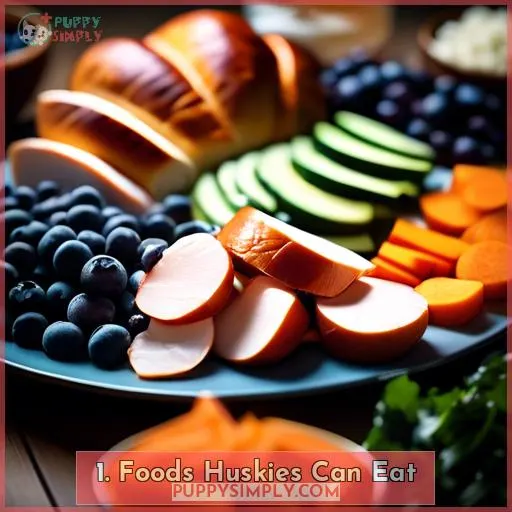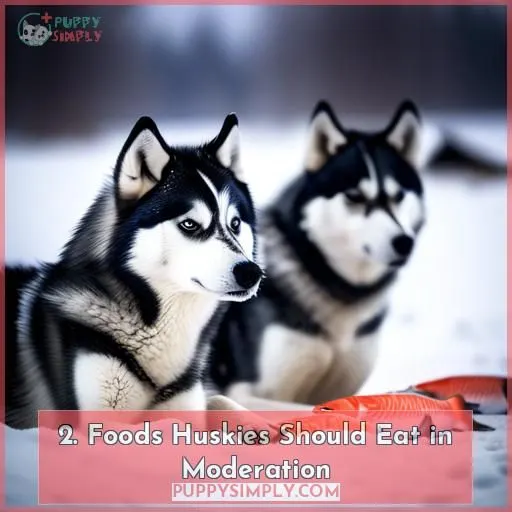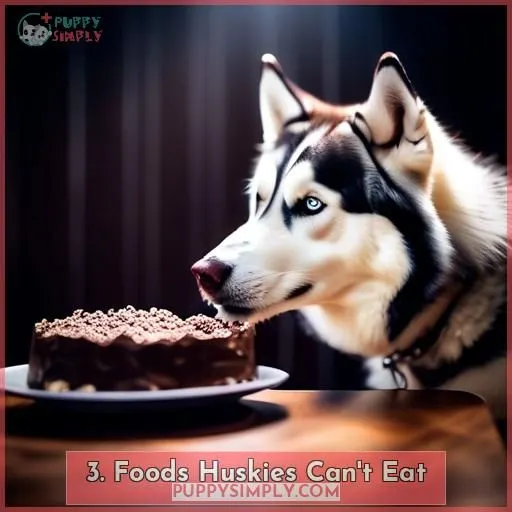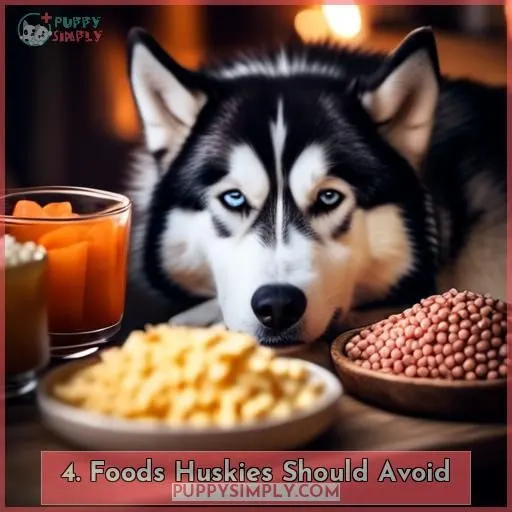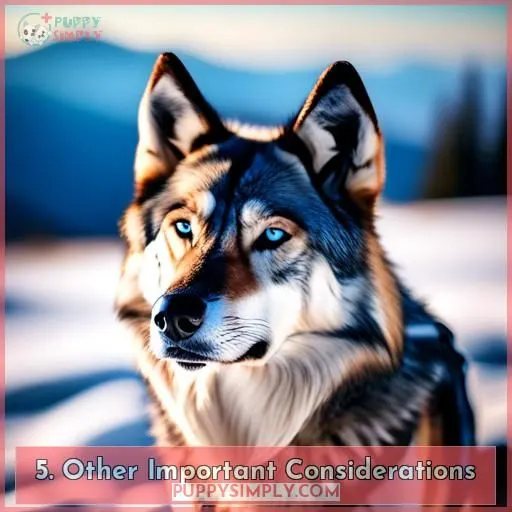This site is supported by our readers. We may earn a commission, at no cost to you, if you purchase through links.
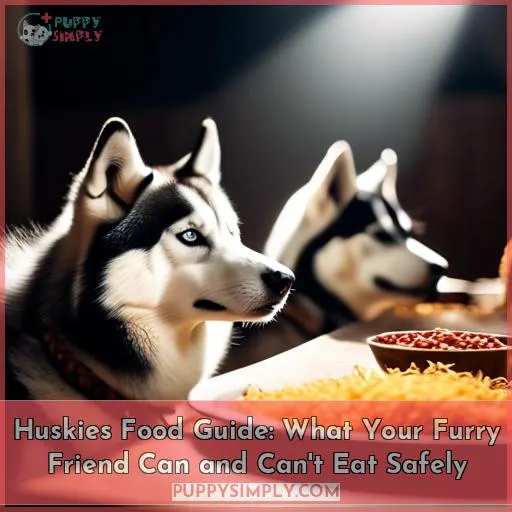
As a Husky owner, it’s imperative to comprehend what foods your furry companion can and cannot consume safely.
While grains, lean proteins, dairy, some fruits, and veggies are generally acceptable, moderation is essential for items such as low-fat cheese and light tuna.
However, chocolate, garlic, macadamia nuts, and high-fat treats should be strictly avoided as they can be toxic.
Common allergens like onions, grapefruit, and strawberries may also cause digestive problems.
The comprehensive guide to what Huskies can and cannot eat covers safe treats, breed-specific dietary considerations, and the significance of consulting your veterinarian for a customized, well-balanced diet plan.
Table Of Contents
Key Takeaways
- Huskies can eat a variety of grains, starches, proteins, dairy, fruits, and vegetables, but moderation is essential to prevent digestive issues or other adverse effects.
- Foods like low-fat cheese and light tuna should be given in moderation, while chocolate, garlic, macadamia nuts, and high-fat treats should be strictly avoided as they can be toxic.
- Common allergens like onions, grapefruit, and strawberries may cause digestive problems, and it’s important to consult your veterinarian for a customized, well-balanced diet plan.
- Huskies can enjoy a variety of fruits, but it’s crucial to keep in mind their potential allergies, and fruit should be given in moderation as part of a balanced diet.
1. Foods Huskies Can Eat
As a husky owner, you should make sure your furry friend’s diet includes a variety of grains, starches, proteins, dairy, fruits, and vegetables. These food groups provide essential nutrients for your husky’s overall health and well-being, but it’s important to introduce them in appropriate portions and forms to prevent digestive issues or other adverse effects.
Grains and Starches
As a husky owner, it’s essential to know which grains and starches are safe for your furry companion.
Huskies can consume grains such as rice and potatoes, which assist in digestion and starch conversion.
However, they might be sensitive to gluten, so choose gluten-free options like quinoa.
Carbohydrate intake should be regulated for weight control.
Vegetables rich in fiber like carrots and green beans can aid in digestion.
Bear in mind to avoid foods high in added sugars and preservatives.
Proteins
In fueling your husky’s adventures, high-quality proteins are the key to a vibrant and healthy life. Here’s the lowdown on safe protein sources:
- Lean meats like chicken and turkey pack a punch with essential amino acids.
- Fish, especially salmon, is a treasure trove of nutrients.
- Eggs are a powerhouse, offering a complete profile of amino acids.
Dairy
Dairy products, such as cheese, milk, and yogurt, can be part of a balanced diet for huskies.
However, it’s important to bear in mind their lactose intolerance and potential protein allergies.
Milk fat content should also be watched to prevent obesity.
Yogurt, with its probiotics, can be beneficial.
Bananas, blueberries, spinach, and tomatoes are dairy-free alternatives for calcium absorption and protein.
Fruits
Huskies can enjoy a variety of fruits, but it’s crucial to keep in mind their potential allergies. Apples, grapes, and raspberries are safe options for huskies, providing essential vitamins and fiber. Always remove seeds and pits before offering fruits to your husky. Remember, fruit should be given in moderation as part of a balanced diet.
Vegetables
Vegetables are an essential part of a husky’s diet, providing essential vitamins and minerals.
However, not all vegetables are safe for huskies.
Some common vegetables that huskies can eat include broccoli, brussels sprouts, carrots, celery, and green beans.
Cooking, freezing, and storing these vegetables properly can help guarantee their safety and nutritional value.
Asparagus, on the other hand, should be avoided due to its potential to cause vegetable allergies in some huskies.
2. Foods Huskies Should Eat in Moderation
- Cheese: A small to moderate amount of cheese is safe for Huskies, but too much can lead to digestive issues. Opt for low-fat or fat-free cheese varieties to keep your Husky’s diet balanced.
- Tuna: Tuna is a great source of protein for Huskies, but it should be given in small amounts due to its high mercury content. Stick to canned light tuna and avoid feeding your Husky tuna more than once a week.
- Mushrooms and Peas: These are safe for Huskies, but they should be given in moderation. Mushrooms can cause digestive issues if consumed in large quantities, while peas can cause gas and bloating.
3. Foods Huskies Can’t Eat
As a responsible and caring dog owner, you want to make sure that your husky is well-nourished and healthy. However, not all human foods are safe for huskies. In this section, we’ll discuss the foods that huskies should avoid to maintain their health and well-being.
- Almonds: Almonds are high in fat and can cause digestive issues in huskies.
- Chocolate: Chocolate contains theobromine, which is toxic to dogs and can lead to heart problems and seizures.
- Garlic: Garlic can cause anemia in dogs due to its sulfoxides and disulfides content.
- Ice cream: Ice cream is high in sugar and fat, which can lead to digestive issues and obesity in huskies.
- Macadamia nuts: Macadamia nuts contain an unknown toxin that can affect the digestive and nervous systems and cause muscle weakness.
These foods should be kept away from your husky to prevent any health issues. Remember, it’s always best to consult with a veterinarian for personalized recommendations on your husky’s diet.
4. Foods Huskies Should Avoid
As a conscientious husky owner, it’s essential to be aware of the foods that can pose a risk to your furry companion’s well-being. While certain foods may be innocuous, others have the potential to provoke allergic reactions, intolerances, sensitivities, or aversions in huskies. Let’s delve into some foods that huskies should steer clear of:
- Cantaloupe: Although not poisonous, it can lead to digestive problems in some huskies.
- Celery: While not toxic, it can cause digestive issues and could become lodged in their throats.
- Cucumber: Though not toxic, it lacks nutritional value and can trigger digestive problems.
- Mango: While not poisonous, it can cause digestive issues and allergic reactions in certain huskies.
- Nectarines: Although not toxic, they can cause digestive issues and allergic reactions in some huskies.
5. Other Important Considerations
You must be extremely cautious when introducing human foods to your husky’s diet.
While some fruits, vegetables, and lean proteins can make safe, occasional treats, many common human foods are toxic or difficult for huskies to digest properly.
It’s vital to thoroughly investigate any new food before offering it to your furry friend.
Always consult your veterinarian if you have any concerns or questions.
Huskies and Foods to Avoid
As a responsible husky owner, it’s essential to be aware of the foods your husky can’t eat.
Some common allergens and sensitivities include kibble, treats, and certain fruits like cucumbers, grapefruit, and strawberries.
Onions are also a no-go.
Antioxidants, such as those found in blueberries, are beneficial for your husky’s health.
Always consult with your veterinarian if you have questions about your husky’s diet.
Safe Foods for Huskies
As a conscientious husky owner, you’ll be keen on making sure your furry companion is receiving appropriate nourishment.
While certain human foods pose no harm to huskies, others might result in health problems.
Here’s a list of treats that are safe for your husky: gluten-free cider, coconut, and pears.
Bear in mind that food allergies and dietary concerns can vary based on breed, so it’s crucial to seek advice from your veterinarian for a tailored diet.
Refrain from giving your husky ice cream, cherries, and other foods that aren’t suitable for them.
Huskies and Human Foods
While you’ve been cautious about what lands in your Husky’s bowl, human foods can be a minefield. Remember, your Husky’s nutritional needs differ from yours. Here’s a quick guide to keep your furry gourmand safe and satisfied:
- Raw food diet: A trend, but is it a fit for your Husky?
- Homemade dog food: Custom meals, but watch for food allergies.
- Portion control: Even treats from Seattle’s finest sushi spots need moderation.
Frequently Asked Questions (FAQs)
What are the most common food allergens for huskies?
The most common food allergens for huskies are wheat, soy, dairy, and beef. You’ll want to watch for reactions like itchy skin, upset stomach, or ear infections after trying new foods. It’s best to introduce items one at a time to identify any problem ingredients.
How can I identify if my husky has a food allergy?
Ironic, isn’t it? Your pup’s picky eating may signal an allergy. Watch for vomiting, diarrhea, or skin issues after meals – those are telltale signs something’s amiss. Keeping a food diary can help pinpoint the culprit.
What should I do if my husky has a food allergy?
If your husky has a food allergy, you’ll need to collaborate closely with your vet. They’ll likely suggest a process of elimination to identify the trigger food, then provide a specialized nutrition plan omitting that allergen. With patience and consistency, you can help your pup regain their health.
Can huskies eat raw food?
You can feed your husky a raw diet, but consult your vet first. Raw meats carry bacteria risks, so proper handling is essential. Start gradually, monitoring for any digestive issues. A balanced, species-appropriate raw diet can be nutritious for huskies.
What supplements can help manage husky allergies?
You can try fish oil, probiotics, or omega fatty acid supplements to help manage your husky’s allergies. But consult your vet first, as excessive supplementation may cause issues.
Conclusion
As a guiding light of canine wisdom, the ultimate reference to what huskies can and can’t eat paves the way to your furry companion’s peak health.
Following this thorough blueprint guarantees a well-rounded, nutritious diet designed specifically for their needs.
It avoids possible dangers while welcoming nature’s generous gifts.
Arm yourself as a responsible pet parent, and let this reference be your unwavering guide on the trek to a healthy, thriving husky.

